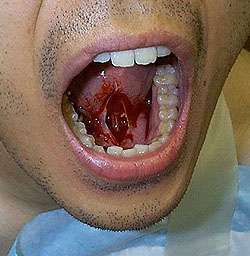Tongue Frenectomy
A tongue frenectomy is the freeing of the tongue by the cutting of the connective tissue underneath the tongue so that the tongue appears longer (and as far as anything outside of your mouth is concerned, it is longer!). It is also done to get the tongue web out of the way so that a tongue piercing may be done (this is only required for people with overly prominent tongue webs and is not normally required).
This is not at all recommended, but it may be possible for a SMALL lengthening to rinse with oral xylocaine and then snip the frenulum with a small pair of surgical scissors. It is very important though NOT to cut any blood vessels, which can be quite prominent in this area. In most cases this cut will simply heal closed. Note that this only works if the frenulum is very pronounced. Stick out your tongue as far as possible -- if the frenulum is now stuck between your lower front teeth, this procedure will help you.
An easier solution is to ask your dentist who can refer you to an oral surgeon.
Risks
The procedure itself can damage glands, blood vessels, and muscular tissue in the area. Short of superficial cuts this procedure really should be left to trained medical professionals. There is also a risk of scarring pulling the frenulum back together and shortening the tongue. As a result, many practitioners will cauterize the incision or remove a section of tissue making closure/stricture less likely.
